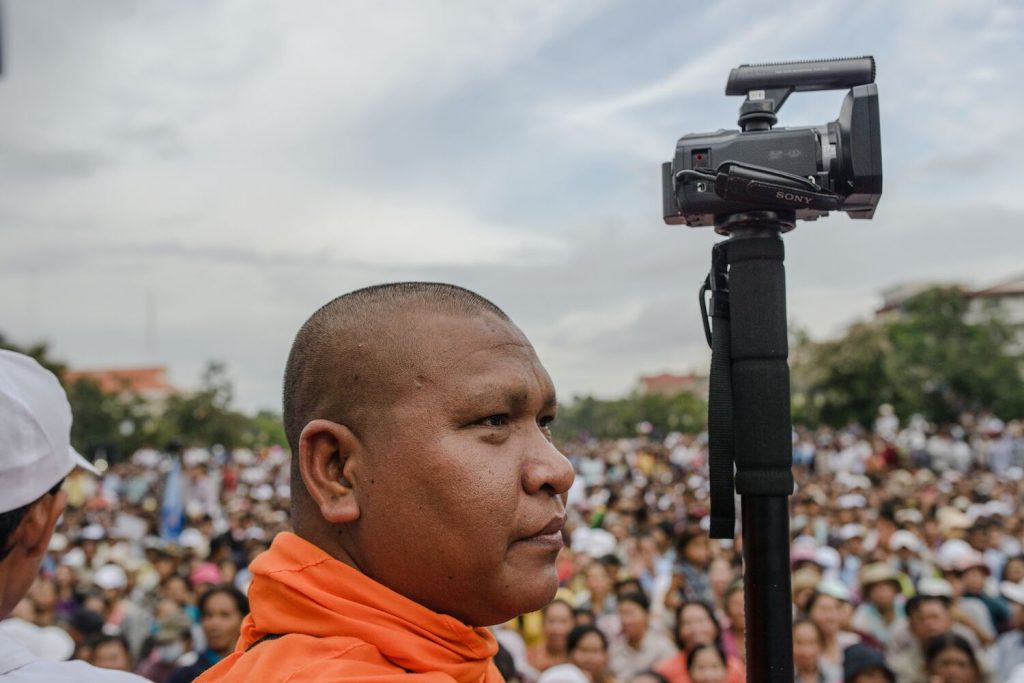Reviewed by Lee Hill
On paper, a two hour plus account of a land dispute in Cambodia sounds like a worthy documentary subject, but also like being forced to eat all your vegetables. The reality is that A Cambodian Spring works on the senses like a sly thriller with close to the bone reminders of how many developers flaunt the law and human rights in collaboration with governments ducking responsibility (see also Grenfell Tower Fire). Chris Kelly’s film is a heart-breaking look at how those with the least are driven to super heroic feats of activism. It is also a sobering study of how an unchecked free market drains the souls of local communities and corrupts the legal protections a civil society should never treat lightly.
Broken into five chapters that span the years 2009 to 2015, A Cambodian Spring focuses on three individuals battling against the unlawful redevelopment of the fishing community around Boeng Kak Lake in Cambodia’s capital city, Phnom Penn. With largely unfulfilled promises to compensate the community, the private company exploits its close financial ties to Prime Minister Hun Sen and his oppressive parliamentary monarchy; the latter keen to do all it can to sustain foreign investment and largely unchecked loans and assistance from NGOs like the World Bank.
Kelly focuses his epic narrative on three of the most vocal activists fighting for the citizens of Boeng Kak. The two mothers of young children, Toul Srey Pov and Tep Vanny, who form a protest group when their husbands are jailed. We see their remarkable odyssey from shy housewives to articulate leaders willing to also face imprisonment for their rights. The other is the Buddhist monk, Venerable Loun Sovath, a savvy social media activist, whose near exhaustive documentation of the dispute gains him little favour with his Buddhist superiors keen to maintain their privileged status and access to the government.
While Kelly’s film cuts and back forth between stories of Pov, Vanny and Sovath, he also keeps us aware of the larger political ferment taking place in Cambodia culminating in the return of exiled opposition leader, Sam Rainsy in July 2013. With the support of several factions including the powerful garment workers union, Rainsy almost succeeds in changing the government through strikes, demonstrations and a bitter election campaign that ends with a truce of sorts. As part of this compromise some, but not all of the Boeng Kak residents receive compensation and resettlement. Pov and Vanny are also released from a potentially long prison sentence to cheering supporters, but soon go their separate ways and fall out completely. Pov moves away from politics to look after her children, while Vanny becomes more of a lobbyist than activist.
Kelly constructs this novel-like account with his own footage, news reports and crucially, much of the remarkable video shot by Sovath. The seemingly self-effacing monk is a cinematographer par excellence and his video diaries as well as his formal attempts to verify each slow step in the legal dispute are acts of raw courage transcending fear. In one incredible scene, Sovath is apprehended by the Buddhist’s own internal police and huddled into a car; each threat and scuffle are all shown with a remarkable mini-camera hidden in the monk’s robes.
While A Cambodian Spring is an exhaustive look at Cambodia’s post-Pol Pot transition from a decimated agrarian economy to an industrial nation, Western viewers will find the issues it raises are too familiar. The increasing abandonment of moral authority by governments and the unregulated action of trans-national investment and development companies is being felt not just in places like Cambodia, but in the US, Canada and Western Europe. Like Steve James’ Hoop Dreams (1994), Chris Kelly is unafraid to show the sacrifices and mistakes individuals make when personal aspirations collide with political, social and economic forces. A Cambodian Spring is an unforgettable study of real people fighting for their most basic rights – to have a home and livelihood – made with sublime skill and empathy.
A Cambodian Spring is in cinemas from Friday May 18th.
